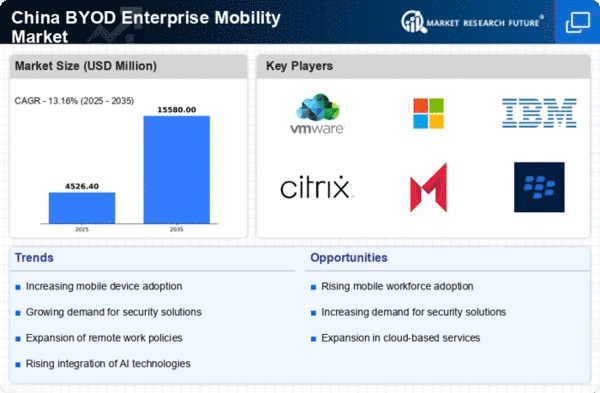Cost Efficiency
Cost efficiency remains a pivotal driver for the byod enterprise-mobility market in China. Organizations are recognizing the financial benefits of allowing employees to use their personal devices for work purposes. By reducing the need for company-issued devices, businesses can significantly lower hardware and maintenance costs. A study indicates that companies can save up to 30% on device-related expenses by implementing byod policies. Additionally, employees often prefer using their own devices, leading to increased job satisfaction and productivity. This financial incentive encourages more organizations to adopt byod strategies, thereby stimulating growth in the byod enterprise-mobility market. As companies continue to seek ways to optimize operational costs, the trend towards byod is likely to gain further traction.
Rising Mobile Workforce
The increasing prevalence of a mobile workforce in China is a key driver for the byod enterprise-mobility market. As organizations embrace flexible work arrangements, employees are utilizing personal devices for work-related tasks. This trend is evident in various sectors, including technology and finance, where remote work has become commonplace. According to recent data, approximately 70% of employees in urban areas are now working remotely at least part-time. This shift necessitates robust enterprise mobility solutions to ensure secure access to corporate resources. Consequently, businesses are investing in byod enterprise-mobility market solutions to enhance productivity while maintaining security protocols. The demand for seamless integration of personal devices into corporate networks is likely to continue growing, further propelling the market forward.
Technological Advancements
Rapid technological advancements in mobile devices and applications are significantly influencing the byod enterprise-mobility market. Innovations in hardware, such as improved processing power and battery life, enable employees to perform complex tasks on their personal devices. Furthermore, the proliferation of mobile applications tailored for business use enhances productivity and collaboration. In China, the smartphone penetration rate has reached over 90%, indicating a vast potential user base for byod solutions. As organizations seek to leverage these advancements, they are increasingly adopting byod policies to harness the benefits of mobile technology. This trend is expected to drive growth in the byod enterprise-mobility market, as companies invest in solutions that facilitate the integration of cutting-edge technology into their operations.
Enhanced Collaboration Tools
The demand for enhanced collaboration tools is driving the byod enterprise-mobility market in China. As businesses increasingly rely on teamwork and communication, the need for effective collaboration solutions has become paramount. Mobile applications that facilitate real-time communication and project management are gaining popularity among organizations. In fact, a survey revealed that over 60% of companies in China prioritize collaboration tools in their technology investments. Byod policies enable employees to access these tools on their personal devices, fostering a more connected and efficient work environment. This trend not only improves productivity but also encourages innovation within teams. Consequently, the growing emphasis on collaboration is likely to propel the byod enterprise-mobility market forward.
Evolving Consumer Expectations
Evolving consumer expectations are shaping the byod enterprise-mobility market in China. As consumers become accustomed to seamless mobile experiences in their personal lives, they expect similar convenience and flexibility in their professional environments. This shift in expectations is prompting organizations to adopt byod policies that allow employees to use their preferred devices. A recent report indicates that 75% of employees believe that having the option to use personal devices enhances their work experience. Companies that fail to meet these expectations may struggle to attract and retain talent. Therefore, the need to align workplace practices with consumer preferences is driving the adoption of byod solutions, ultimately contributing to the growth of the byod enterprise-mobility market.
















